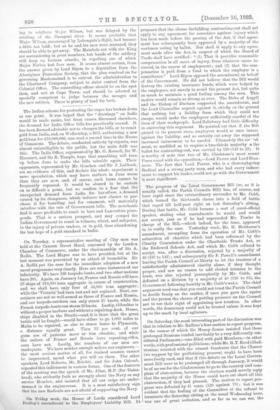The progress of the Local Government Bill (or, as it
is usually called, the Parish Councils Bill) has, of course, not been rapid since the extraordinary surrender to Mr. Cobb, which turned the thirteenth clause into a field of battle that raged till half-past eight on last Saturday's sitting. During that battle, Mr. Cobb became a sort of quasi-official speaker, stating what amendments he would and would not accept, just as if he had superseded Mr. Fowler in charge of the Bill,—which indeed, for the time, appeared to be really the case. Yesterday week, Mr. H. Hobhouse's amendment, exempting from the operation of Mr. Cobb's subsection all charities which had been reformed by the Charity Commission under the Charitable Trusts Act, or the Endowed Schools Act, and which Mr. Cobb refused to accept, was, after a discussion, rejected by a majority of 46 (187 to 141) ; and subsequently Sir F. Powell's amendment leaving the Parish Council at liberty to let the trustees of a satisfactorily administered charity alone, if they thought proper, and saw no reason to add elected trustees to the trust, was also rejected peremptorily by Mr. Cobb, and defeated on a division by a majority of 40 (135 to 95), the Government following humbly in Mr. Cobb's wake. The chief argument used was that you could not trust the Parish Council to decide freely on the matter, if once you gave the squire and the parson the chance of putting pressure on the Council not to use their right of appointing new trustees. In other words, the democracy could not be trusted unless it was kept up to the mark by local agitators.










































 Previous page
Previous page